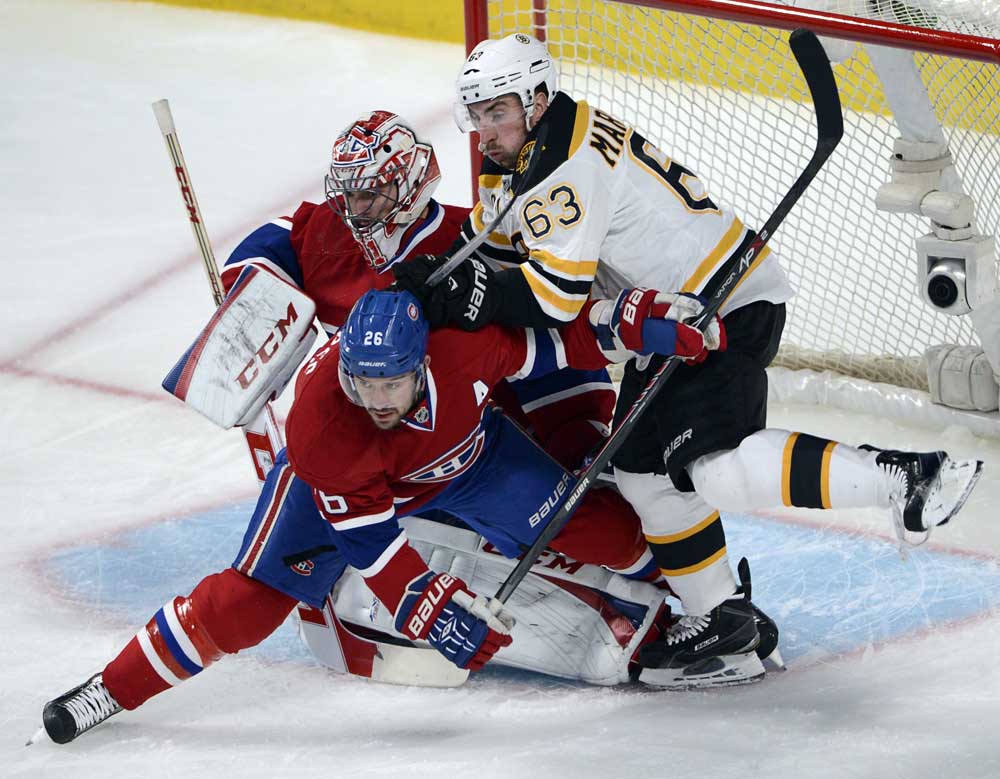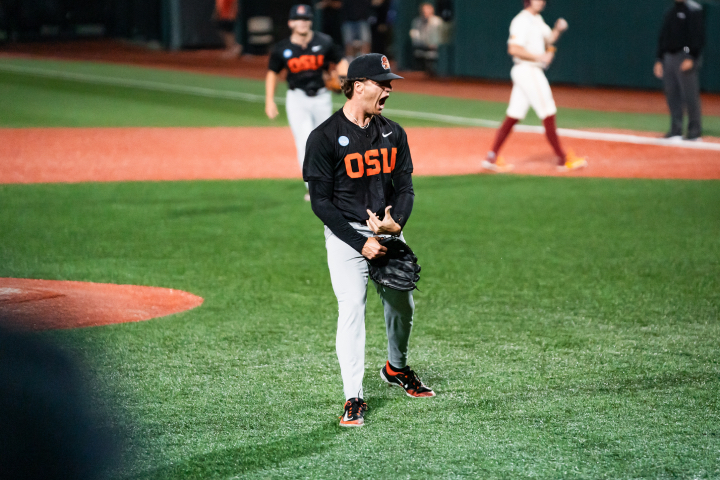Crease battles exact a toll in the playoffs
Published 12:00 am Sunday, May 11, 2014

- Ryan Remiorz / The Canadian PressMontreal defenseman Josh Gorges and Boston forward Brad Marchand battle in front of Canadiens goalie Carey Price during Game 3. Battles in front of the net take a toll on the participants, especially in the playoffs when teams play more physical.
Boston Bruins forward Jarome Iginla knows the playoffs can be a painful experience. In every game, he is poked, slashed, crosschecked, shoved, punched, tripped, sworn at repeatedly and thrown to the ice.
Few if any penalties are called against Iginla’s opponents for these very un-Lady Byng-like activities, as hockey’s unwritten postseason code comes into play.
Iginla, like a few other forwards, expertly practices the dark playoff art of screening the goalie.
It’s a twisted mindset in which players know they will take a heap of abuse, but they still willingly plant themselves as close as possible to the crease to block a goalie’s vision.
This obstruction can aid in a teammate’s scoring, and in the screener’s redirecting a shot or being in the perfect spot to bang home a loose puck.
Iginla screened Montreal goalie Carey Price in Game 3, leading to a tip-in goal.
“It’s something you know you have to do in order to be successful in the playoffs, and you know you will pay a price for being there,” said Iginla, who had three goals and two assists over the first nine games of the playoffs. “It’s something you accept. You’re going to get the sticks, whacks, the crosschecks — they’re going to come, but you also know that you’re making life hard for the goalie and defense. You do it because it’s the little things you have to do right to win these tight playoff games.
“Everybody wants to win; every team is good. It comes down to who is willing to sacrifice themselves more, take the bigger risk.”
Overly aggressive goalie screening, like New York Rangers forward Sean Avery’s 2008 antics against Devils goalie Martin Brodeur, can draw an unsportsmanlike minor.
The Avery Rule, as it is known, clarified the goalie interference rule. The NHL delivered the clarification after Avery’s show in the Rangers’ 4-3 Game 3 overtime loss. Brodeur was so annoyed by Avery’s stick-waving and poking that he refused to shake his hand after the Rangers won the series in five games.
Retired Detroit Red Wings forward Tomas Holmstrom made his living screening goalies, and also in getting goals waved off for interference.
Penguins defenseman Kris Letang does not like forwards camping in front of his goal. It’s like seeing the neighborhood youngsters hanging out on your front lawn, so Letang turns the metaphorical garden hose on them.
“Sometimes, I will crosscheck guys in front to move them,” he said. “But even if he would duck or something, I don’t think I would catch him in the head. That would be pretty high, especially with my height.”
Kings forward Justin Williams said he understood that the boundary between physical play and a penalty became blurred during the playoffs, when players push the limits.
“You certainly want to have a net presence, but you also want to have a guy away from the net,” said Williams, who scored four goals and three assists in the Kings’ first 10 playoff games. “You don’t want to have two guys just standing next to each other; you want to be staggered a little bit so you can get those opportunities or you get a chance to recover the puck and get another opportunity.
“There’s a lot of big boys on both teams that want that front of the net, so it’s tough to find space, but at playoff time, you do it.”
Kings forward Andrew Cogliano said he enjoyed the playoff chess matches, and the pain, for real estate in the crease.
“There’s no better feeling than taking a puck off the face and scoring a goal,” said Cogliano, who had a goal and four assists in nine playoff games. “I’ll take that any day of the week. It might take some stitches, but when you score a goal like that, you know you’ve battled and you did the right thing.”
So what about the goalie, the target of all this activity? Giving in to frustration and anger, and choosing to chop down a forward with a satisfying two-handed stick whack, could lead to a penalty and a game-changing power play.
“You know that they’re coming to the net and trying to screen you,” Ducks goalie Jonas Hiller said, adding that part of doing his job was finding pucks through screens.
“Everybody’s a little more desperate and willing to sacrifice a little more to do that extra thing,” he said.
“I think it’s on both sides, offense and defense, so there are sometimes harder battles in front that sometimes make it tougher for a goalie to find the puck, but you still have to find a way.”






